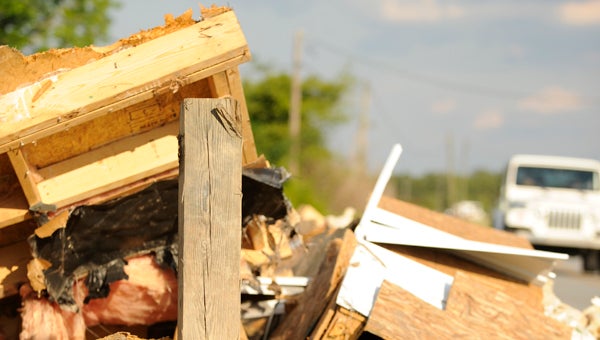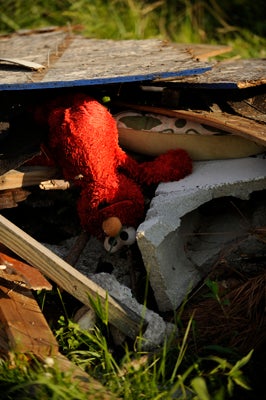WHICHARDS BEACH WOE: Mountains of tornado debris a concern for residents
Published 9:53 pm Saturday, June 7, 2014

VAIL STEWART RUMLEY | DAILY NEWS
ROAD RAGE: Residents on Whichards Beach Road in Chocowinity are frustrated by debris hauled to and left roadside from the April 25 EF3 tornado that tore through the area.
CHOCOWINITY — Over a month has passed since an EF3 tornado ripped a path of devastation through Beaufort County. The destruction so evident in the initial days afterward is slowly disappearing. However, much of the debris is not.
In parts of Beaufort County — Asbury Church Road, Neck Road, parts of Chocowinity — debris still peppers the landscape. But on Whichards Beach Road, county residents are growing concerned about the lack of action in removing the waste.
“People are actively stacking it down on Whichards Beach Road, doing anything they can to get it off their property,” said John Pack, Beaufort County Emergency Management coordinator.
“It” constitutes construction and demolition-type debris: vinyl siding and particle board, roofing materials, pieces of mobile homes, in addition to parts of boats and anything else that was in the tornado’s path on April 25.
“It’s just about anything you can imagine from houses being totally destroyed and mobile homes being torn apart,” Pack said.
It’s also an eyesore and one that is prompting neighbors and other county residents to speak out about the lack of action in dealing with the debris.
At the June 2 Beaufort County Commissioners meeting, Whichards Beach Road resident Warren Whichard told commissioners that he personally had developed $65 million-worth of property on Whichards Beach Road, for which the county receives nearly $400,000 in property taxes a year, and questioned why the county was doing nothing to help clean up the debris.
“It’s getting to be a health hazard. Rats are making a house of it,” Whichard said. “It’s been over five weeks. … Are you going to make an effort?”
Washington realtor Scott Campbell is asking the same question, as the debris could have a chilling effect on real estate sales in the area. Last year, Whichards Beach Road brought in $2 million in property sales. Currently, $1.65 million in property is for sale. Campbell joked that any potential buyer would have to be blindfolded to visit the waterfront properties located in the area.
Since the federal government declined to name Beaufort County a disaster area, FEMA dollars aren’t pouring in to help with the cleanup — that means it’s in the hands of property owners, according to county officials. But much of the debris is now located on the roadside’s 15-foot easement and is going nowhere, as property owners who lost their homes can no longer afford to pay cartage fees. Campbell and others feel like the county should be making an effort to address the problem.

VAIL STEWART RUMLEY | DAILY NEWS
REMNANTS: Pieces of lives scatter the roadside — like this stuffed Elmo doll — along with cement blocks and other building materials that once made someone’s home.
“They’ve shrugged their shoulders and said “No money.” What do you mean no money?” Campbell asked. “If there is debris that has been piled up along the road that is clearly visible and clearly a problem, I think the county needs to bite the bullet and lend some assistance. … Beaufort County is supposed to step up to the plate and do what it’s supposed to do, which is advocate and care for the citizens of Beaufort County, not shrug its shoulders.”
Brenda Rogers is another Whichards Beach Road resident concerned with the mountain of trash on the sides of the road. She said many residents would be happy to pitch in and lend a hand to remove what’s there, but it’s simply too large.
“We’d go out there with gloves and throw stuff in a bin — but this is halves of people’s roofs and halves of their porches,” she said. “We don’t have the equipment to do that. Not only that, but some of this is wetlands. I’m sure that’s something that could require a permit to do something about.”
Commissioner Al Klemm said he empathizes with the residents in the area — he had to pay thousands of dollars to remove debris from his property after Hurricane Floyd — but the county has never paid for cleanup after a disaster.
“We’d be setting a precedent for the county and we’ve never done anything like that,” Klemm said.
Klemm is concerned that the situation will eventually deteriorate into one where the health department will have to step in.
“Something will have to be done and exactly what that avenue is, I don’t know. It would not be very pleasant, I’m sure,” Klemm said.
Beaufort County Health Director James Madson said health risks in relation to debris of this sort include physical risk — people could be exposed to tetanus through cuts from climbing through debris — as well as population of unwanted species: pooled water in debris could lead to higher mosquito populations and mosquito-borne diseases and vermin could take up residence. Another concern would be leakages from any septic system destroyed during the tornado.
The lack of action on the part of the county is leaving many residents frustrated and leading other residents to come up with other ways to get rid of debris — by burning it. However, in Beaufort County there are laws: burning trees is fine; burning destroyed houses is not.
“I’ve had to ask people not to burn things,” Pack said. “You cannot burn anything but vegetative debris legally. That’s what I’ve had to explain to some people.”
Pack said the toxic, black smoke from the burning of vinyl has led neighbors to call in complaints.
Both Campbell and Rogers believe there must be other options out there, ones the county should be making an effort to explore, even if it’s nothing more than a strategizing session with the community.
“Let’s do something. If nothing comes of it, so be it, but at least they would have tried,” Campbell said. “What annoys me is that I’ve seen absolutely no reaction from the commissioners. There should be some more outrage by the county commissioners, period. And some advocacy.”
“My guess is if this happened in downtown Washington in front of the County Commissioners building, it would have been cleaned up already,” Rogers said. “This is a state road. I don’t know, it seems like between the two of them (state and county) you’d think that they would come up with something.”
Calls to the Beaufort County Managers Office were not returned by the time of publication.





